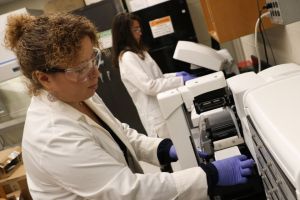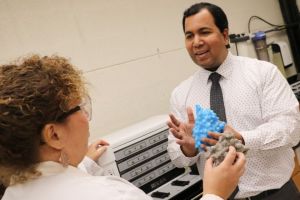A Patient-Centered Approach to Cancer Care

Innovations in science and medicine have dramatically shifted today’s approach to cancer care through the discovery of new treatments and techniques.
One of the breakaway innovations, immunotherapy, introduced a new treatment option beyond the traditional methods of radiation, chemotherapy, and surgery. Designed with the fighting power of the body’s own immune system, immunotherapy provides patients with a personalized care plan that enables the body to identify, attack, and eliminate cancer cells.
The problem with current immunotherapy treatments on the market, such as Keytruda, is that while they deliver proven positive results for patients, they can cause significant side effects and come with a high price tag.
Juliette DiFlumeri, a junior chemical engineering major, is determined to change that.
“It’s so hard for people who can’t afford treatment, or can’t withstand certain types of treatment, to find something that works for them,” DiFlumeri said. “That’s why it’s important to do this research because it will give more opportunities to people and help them.”
DiFlumeri works as an undergraduate research assistant in the NanoBio Laboratory, led by Chemical Engineering Professor and Associate Dean Sachin Patil, investigating ways to repurpose FDA-approved drugs that are easier on the patient both physically and financially. She and fellow chemical engineering major Elena Fattakhova presented the latest research findings at Widener’s Summer Undergraduate Research and Creative Activities (SURCA) Symposium on September 20.
"We’re looking for a way to combine the positive effects from the different treatment options as well as reduce the side effects and costs," said DiFlumeri.
The body’s immune system is designed to fight off invasions by protecting healthy cells from harmful intruders. When cancerous cells appear in the body, however, they can go undetected as they interact with healthy cells, rendering the immune system powerless. This happens when cancerous protein receptors, known as PD-L1 and PD-L2, bind to normal protein receptors, called PD-1, that are expressed on healthy immune T-lymphocyte cells.
In his peer-reviewed research, Patil has published promising results which indicate that small molecules have immediate clinical potential similar to the highly effective protein antibodies therapies like Keytruda and other related immunotherapies.
“Keytruda and other such immunotherapy drugs are protein-based, which present various drawbacks including very high costs,” said Patil. In response, the NanoBio Lab “is working to discover alternative small, chemical molecule-based immunotherapeutic drugs,” he said.
Using high throughput computer simulations, DiFlumeri and Fattakhova worked alongside Patil this summer to identify and test different small molecule, FDA-approved drugs capable of fighting cancer by interrupting the pathological PD-1, PDL1-PDL2 protein receptor interactions. Working with FDA-approved drugs ensures DiFlumeri and the researchers that the compounds are proven to be clinically safe which in turn allows them to be made available to patients faster than newly developed drugs, if proven effective.
While DiFlumeri’s involvement in the lab began at the end of her freshman year, her findings built upon years of student-faculty research led by Patil through grant funding from the W.W. Smith Charitable Trust. The early exposure to the research and the close mentorship shaped her trajectory at Widener and put her on track toward her goal of becoming a medical researcher.
Even though it’s a small school, there is such a wide breadth of research that you can get into. It really opens your eyes to where you can go with your career. — Juliette DiFlumeri '21
For Patil, partnering with students like DiFlumeri and Fattakhova strengthens the lab’s findings because the student-researchers “bring a new, fresh perspective to ongoing cancer immunotherapy research in our lab.” The collaborative investigation supports Patil’s
efforts to deliver improved treatment options to patients.
In addition to gaining hands-on experience in the lab, DiFlumeri has presented the intricate and potentially life-saving findings at university symposiums and at Posters on the Hill in Washington, D.C. last year.
With each advancement in their findings and opportunity to present, DiFlumeri is reminded of why she chose a path in chemical engineering and how her degree can help patients tackle a cancer diagnosis.
“In engineering you can change and discover things that have the chance to help people in the long run, not just in the short run. We’ll make a difference for people,” DiFlumeri added.




